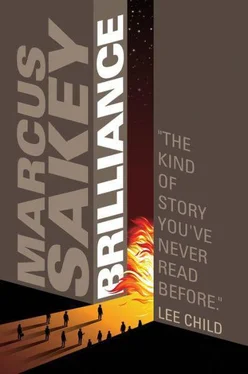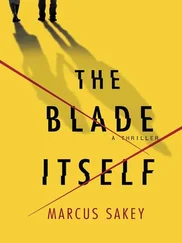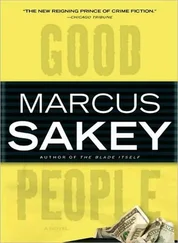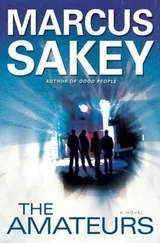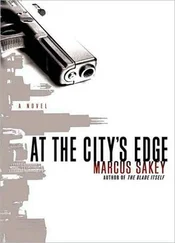“No. And in twenty minutes, I’m going to bring you in.”
“Jesus, Bobby. I’ve been a DAR agent for the last six months. I mean, teams came after me four times . Four. And in that time, I never killed one agent. Never even hurt one, more than his pride. Why do you think that is?”
“You just killed one.” Quinn’s eyes hard. “In the cemetery.”
“Yeah,” Cooper said. “Well, I’m not an agent anymore. And once you take a look at that,” he jerked his head toward the datapad, “I don’t think you will be either.”
“What is it?”
“Drew Peters’s dirtiest secret. It’s what I was picking up in the cemetery.”
“I thought you were after Smith.”
“So did I. Turns out, I was wrong.”
Quinn wanted to pick up the datapad. Cooper could see it, could read it on him clear as morning sunlight. “Go ahead.”
Bobby looked at him, and Cooper said, “Jesus, man, I’m handcuffed to the bar. What do you think I’m going to do, turn into a bat and fly away?”
A muscle twitched in Quinn’s cheek, and Cooper realized his partner had been about to make a joke. He didn’t, but Cooper knew the man, had sat alongside him for hours, days, years. You’re getting through to him. “Okay, look, I’ll do it. Okay?”
“Slowly.”
Slowly, Cooper picked up his d-pad. Propped it on the rail so they both could see. Clumsy with his left hand, he activated it. Then started the video.
The same room he’d seen before, a hotel or a safe house. Matching furniture with no sense of style, walls painted putty. There was a window, and through it trees.
Director Drew Peters paced. He was younger here. The man’s hair and style hadn’t changed in the whole of the time Cooper had known him, but the lines on his forehead, the sagging beneath his eyes, those had deepened with time.
“When is this?” Quinn asked.
“Five years and between eight and nine months ago.”
“How can you be so—”
“Watch.”
On the screen, Peters walked to the table, picked up a glass of water, sipped at it. There was a knock on the door.
“Come in.”
Two men in plain suits entered. The kind of men who looked like they were wearing sunglasses even when they weren’t. They nodded at Peters, then checked the room. Finally, one spoke into a middle distance. “We’re clear, Mr. Secretary.”
A man walked into the room. Average height, good smile, conservative suit.
“Hey,” Quinn said. “That’s—”
“Yes.”
That had been Cooper’s first clue as to the age of the video. It had to be at least five years old, because the man who walked through the doors was, at the time, the secretary of defense. A connected man, a savvy politician, the kind people treated respectfully not only because he knew where the bodies were buried, but because he’d put his fair share in the ground himself. Secretary Henry Walker.
Only now, his title was different. It had been for five years. Since 2008…when he’d won his first presidential election. The first of two. Cooper had voted for him in both.
Even watching it again, knowing what was coming, how much worse things got, Cooper felt like he couldn’t breathe. The president’s famous March 12th speech echoed in his inner ear.
Let us face this adversity not as a divided nation, not as norm and abnorm, but as Americans. Let us work together to build a better future for our children.
A cry for tolerance, for humanity. A call to all people to work together.
A lie.
On the screen, the two men shook hands, exchanged pleasantries. Walker dismissed his security. Quinn said, “Okay, Cooper, other than the fact that I feel a little dirty watching this, what’s the point?”
“I’ll show you.” With his left hand, he scrubbed forward to 10:36.
Walker: It’s the liberal hand-wringing that drives me batshit. Don’t people understand that civil rights are a privilege? That when it comes to defending our way of life, sometimes they’re a luxury we cannot afford?
Peters: The public doesn’t want to believe a war is coming.
Walker: God willing, they’re right. But I was always taught that God helps those who help themselves.
Peters: My feelings exactly, sir.
To 12:09:
Walker: It’s not that I hate the gifted. I don’t. But only a fool doesn’t fear them. It’s a lovely sentiment to say that all men are brothers. But when your brother is better than you in every way, when he can out-plan, out-engineer, out-play you…well, it’s hard to be the little brother.
Peters: Normal people need a wake-up call. They need to remember that our very way of life is at stake.
To 13:35:
Peters: Sir, I understand your desire to choose your words with care. So let me be the blunt one. If we don’t do something, in thirty years, normal humans will have become irrelevant. At best.
Walker: And at worst?
Peters: Slaves.
To 17:56:
Walker: The thing is, there’s two ways to go into a fight. You can do it wearing body armor and slinging a rifle, or you can show up in your skivvies. Not only that, but the guy who looks like he can fight rarely has to.
Peters: That’s it exactly. I don’t want genocide. But we need to prepare ourselves. We have the right to fight for our own survival. And this is not a war that can be fought with tanks and jets.
Walker: You’ve heard rumors about the congressional investigation into Equitable Services.
Peters: Yes. But that’s not why—
Walker: Don’t soil yourself. I’m not threatening you. But I do wonder whether this plan of yours is patriotism or self-preservation.
Peters: Mr. Secretary—
Walker: What’s the target?
Peters: Are you sure you want to know the operational details, sir?
Walker: All right. You’re right.
To 19:12:
Walker: How many dead are you thinking?
Peters: Somewhere between fifty and a hundred.
Walker: That many?
Peters: A small price to defend hundreds of millions.
Walker: And these will be civilians.
Peters: Yes.
Walker: All?
Peters: Yes, sir.
Walker: No. No, that won’t do.
Peters: To ensure they’re seen as terrorists, it has to be civilians. An attack against the military frames them as a military power. It defeats—
Walker: I understand. But we need a symbol of the government there as well. Otherwise, it will seem random and unfocused.
Peters: What about an attack on your office?
Walker: Let’s not get carried away. No, I was thinking a senator, or a Supreme Court judge. Someone respected, symbolic. And we’ll need a patsy, too. A capable one who won’t get caught right away. Someone to become the boogeyman.
Peters: I have one in mind, sir. An activist named John Smith.
Walker: I know of him.
Peters: He’s already made a pest of himself; it’s only a matter of time before he would resort to violence anyway. And he’s very capable. Once we tip him over, he’ll play the part. Any, ah, symbolic target in particular?
Walker: I can think of a few.
To 24:11:
Walker: The key is to not let this get out of hand. We need an incident that unites the country, that justifies your work. Not something that kicks off a holy war.
Peters: I understand, and I agree. Frankly, the gifted are too valuable to risk.
Walker: Amen. But they need to be kept in their place.
Peters: Sometimes war is the only route to peace.
Walker: I think we understand one another.
To 28:04:
Peters: I’ve already chosen a target. A restaurant. I’ve got teams ready.
Walker: This is a hard assignment. Some of your shooters might flinch.
Peters: Not these men.
Walker: And afterward? Can you depend on their discretion?
Читать дальше
